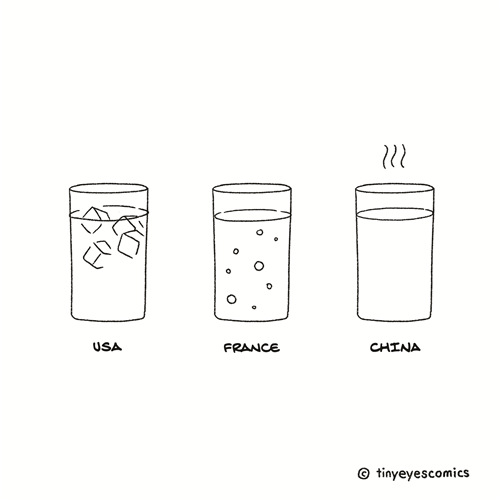Drawing on her experience
By Wang Qian | China Daily | Updated: 2020-09-02 07:40

Focusing on everyday topics, including family relationships, food, different ways of thinking and social customs, Cao's comics feature a girl named Tiny Eyes and portray her life in a lighthearted way.
"Although Tiny Eyes looks similar to me, she is not me. She can be anyone who feels related to the experience," Cao says, adding that the comics can shed light on China for foreigners who are curious about the country.
A book of the Tiny Eyes comics was published in France in May last year and an English version is currently in production.
Its French publisher Equateur says about the book: "In a few strokes, Siyu Cao produces scenes of everyday life … and challenges the prejudices and representations we make of each other, deconstructing them with personal anecdotes."
Italian magazine Grazia says: "Her simple sketches have played a big part in demystifying Chinese culture."
Her comic creation has continued and COVID-19 has made her realize how important it is to help people from different cultural backgrounds to communicate with each other. Using her pencil, she hopes that her drawings can help people stay connected in a socially-distanced world.
One of her comics shows the cultural differences behind the debate about usage of masks, which has been a divisive topic throughout the pandemic. To wear or not to wear, that is the question that has led to unexpected controversy and, in some cases, even physical conflict, in some parts of the world.

At the beginning of the outbreak, Cao heard a case about an Asian woman in France wearing a mask being insulted and expelled from a train by other passengers.
In a bid to illustrate the cultural approach to the wearing of masks, she posted a comic strip illustrating a Chinese girl wearing a mask on the metro being stared at weirdly by others. In the strip she explains that Chinese people wear masks to prevent infection, as well as avoid passing the virus to others, especially since the SARS outbreak in 2002-03, while before April, the French were encouraged to wear a mask only when showing coronavirus symptoms.
As France has witnessed a record high COVID-19 surge in recent months, several cities, including Paris and Nice, last month made masks mandatory.
"The wearing of masks is just one example of a cultural difference that can trigger tension, even discrimination, during the pandemic," she says.
Many people around the world have commented on the post. An Instagram user named Carjoyflo said: "Fascinating cultural difference. That helps explain it-I have a number of Chinese international students at my California school who are wearing masks." Another user, Vagabondying, said: "Exactly the same in Italy. Very well explained."
One of her popular illustrations shows how complicated French cutlery compares to the Chinese tradition of using chopsticks. Chinese people can use chopsticks to eat everything, but in France, there are no less than eight types of fork, knife and spoon required to finish a single, multiple-course meal.
Another culinary difference between Chinese and Westerners is hot water. In her illustration, no matter if it is winter or summer, in a French restaurant, sparkling water is always served before the meal; in the US, the default is usually water with ice; while in China, people drink hot water a lot, because unprocessed tap water is undrinkable and people believe that hot water is good for the health.
Besides food culture, she also covers expressions of love in her comics. Although emotions are universal, how to express them differs between East and West. In her illustrations, while an American professes love for her mother directly over the phone, Tiny Eyes displays the same sentiment by asking after the health of her loved ones and buying nice things to make their life more comfortable.
Many foreign readers say they find her illustrations enlightening, helping them to understand China, while Chinese immigrants have felt seen and understood, according to Cao.
This feedback and connection with her readers has been "the biggest motivation" for her to keep creating.
She remembers that her comics helped an English teacher who adopted her daughter from China in 2002 gain "great insight" about the culture behind her little girl.
A neurosurgeon in Berlin, who was born in China, but grew up in Germany and studied in the US and Italy, thanked her, saying: "I really love your comics, they are not only cute and funny, but portray complex and multilayered issues and thoughts in a very intelligent and light way.
"I am sure that they are also inspiration for those who have completely different upbringings and cultural backgrounds and that is the beauty of your work."























